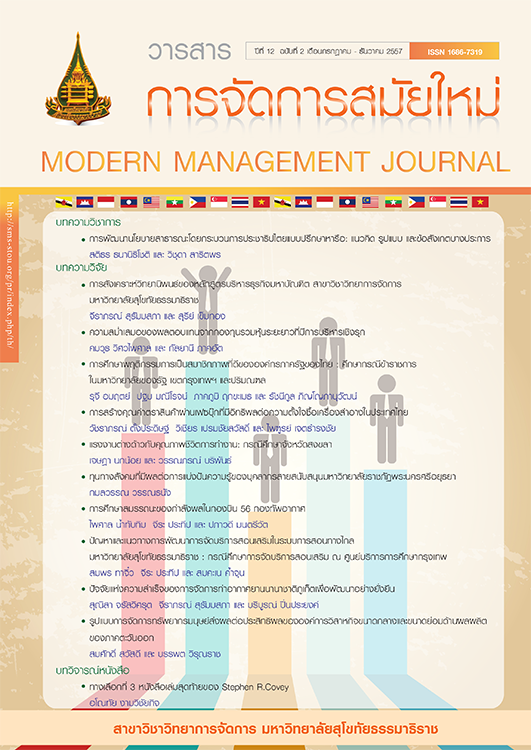ALIEN WORKERS AND QUALITY OF WORK LIFE: THE CASE OF SONGKHLA PROVINCE
Keywords:
ปัจจัยแห่งความสำเร็จ, ท่าอากาศยานนานาชาติภูเก็ต, การพัฒนาอย่างยั่งยืน, KeySuccess Factors, Phuket International Airport, Sustainable DevelopmentAbstract
บทคัดย่อ
การวิจัยครั้งนี้มีวัตถุประสงค์เพื่อ (1) ศึกษาปัจจัยแห่งความสำเร็จในการจัดการท่าอากาศยานภูเก็ตเพื่อการพัฒนาอย่างยั่งยืนทั้งปัจจัยภายในและปัจจัยภายนอกองค์การ (2) ศึกษาระดับความสำเร็จในการจัดการท่าอากาศยานภูเก็ต เพื่อการพัฒนาอย่างยั่งยืนตามมุมมองของพนักงานท่าอากาศยานภูเก็ตและบุคคลภายนอกที่ปฏิบัติงานในท่าอากาศยานภูเก็ต (3) เปรียบเทียบความคิดเห็นของพนักงานท่าอากาศยานภูเก็ตและบุคคลภายนอกที่ปฏิบัติงานในท่าอากาศยานภูเก็ต ต่อความสำเร็จในการพัฒนาอย่างยั่งยืนของท่าอากาศยานภูเก็ต (4) ศึกษาปัจจัยภายในและภายนอกที่มีผลต่อความสำเร็จในการจัดการท่าอากาศยานภูเก็ต เพื่อการพัฒนาอย่างยั่งยืน
ประชากรที่ใช้ในการศึกษา ได้แก่ พนักงานท่าอากาศยานภูเก็ตและลูกจ้างจำนวน 371 คน บุคคลภายนอกที่ปฏิบัติงานในท่าอากาศยานภูเก็ตซึ่งเป็นผู้ประกอบการเชิงพาณิชย์และผู้ประกอบการสายการบิน จำนวน 148 คน กำหนดขนาดตัวอย่างด้วยสูตรของยามาเน่ ได้กลุ่มตัวอย่าง 226 คน แบ่งเป็นพนักงานท่าอากาศยานภูเก็ต จำนวน 156 คน และบุคคลภายนอกที่ปฏิบัติงานในท่าอากาศยานภูเก็ต 70 คน ใช้วิธีการสุ่มแบบแบ่งชั้นภูมิและสุ่มแบบง่าย เครื่องมือในการเก็บรวบรวมข้อมูล ได้แก่ แบบสอบถามและทำการสัมภาษณ์ผู้บริหารของท่าอากาศยานภูเก็ตจำนวน 11 คน สถิติที่ใช้ในการวิเคราะห์ข้อมูล ได้แก่ ค่าความถี่ ค่าร้อยละ ค่าเฉลี่ย ค่าเบี่ยงเบนมาตรฐาน การวิเคราะห์ค่าที การวิเคราะห์ตัวแปรส่งผ่าน การวิเคราะห์การถดถอยเชิงเส้นอย่างง่าย และการวิเคราะห์เนื้อหา
ผลการวิจัยพบว่า (1) ปัจจัยแห่งความสำเร็จในการจัดการท่าอากาศยานภูเก็ตเพื่อการพัฒนาอย่างยั่งยืน โดยตามความคิดเห็นของผู้ตอบแบบสอบถามที่เป็นพนักงานท่าอากาศยานภูเก็ตอยู่ในระดับ “มาก” ได้แก่ นโยบายมีความทันสมัยสอดคล้องกับสภาพเศรษฐกิจ วัฒนธรรมจิตสำนึกการบริการและเน้นลูกค้าเป็นศูนย์กลาง และอัตราค่าครองชีพที่สูงขึ้น และตามความคิดเห็นของผู้ตอบแบบสอบถามที่เป็นบุคคลภายนอกปฏิบัติงานในท่าอากาศยานภูเก็ตอยู่ในระดับ “ปานกลาง” ได้แก่ ประสิทธิภาพในการทำกำไร วัฒนธรรมในการทำงานร่วมกัน และความต้องการมาท่องเที่ยวจังหวัดภูเก็ตมากขึ้น (2) ระดับความสำเร็จในการพัฒนาอย่างยั่งยืนของท่าอากาศยานภูเก็ตโดยรวม ตามความคิดเห็นของผู้ตอบแบบสอบถามที่เป็นพนักงานท่าอากาศยานภูเก็ตและตามความคิดเห็นของผู้ตอบแบบสอบถามที่เป็นบุคคลภายนอกที่ปฏิบัติงานในท่าอากาศยานภูเก็ตอยู่ในระดับ “มาก” และ “ปานกลาง” ตามลำดับ โดยทั้ง 2 กลุ่ม มีความเห็นว่าท่าอากาศยานภูเก็ตมีความสำเร็จในการพัฒนาอย่างยั่งยืนด้านเศรษฐกิจมากกว่าด้านสังคมและสิ่งแวดล้อม (3) ผู้ตอบแบบสอบถามที่เป็นพนักงานท่าอากาศยานภูเก็ตและผู้ตอบแบบสอบถามที่เป็นบุคคลภายนอกมีความคิดเห็นต่อความสำเร็จในการพัฒนาอย่างยั่งยืนของท่าอากาศยานภูเก็ตแตกต่างกันอย่างมีนัยสำคัญทางสถิติที่ .05 (4) เมื่อวิเคราะห์ตัวแปรส่งผ่านพบว่าปัจจัยภายในองค์การด้านการบริหารทรัพยากรมนุษย์ได้รับอิทธิพลส่งผ่านจากปัจจัยภายในองค์การด้านนโยบายและกลยุทธ์องค์การ ปัจจัยภายในด้านนโยบายและกลยุทธ์องค์การกับปัจจัยภายในด้านการบริหารทรัพยากรมนุษย์ได้รับอิทธิพลส่งผ่านจากปัจจัยภายนอกองค์การ แต่ไม่สามารถส่งผลต่อความสำเร็จในการพัฒนาอย่างยั่งยืนของท่าอากาศยานภูเก็ตอย่างมีนัยสำคัญทางสถิติที่ .05 แต่หากวิเคราะห์การส่งผลโดยตรงแล้ว ที่ระดับนัยสำคัญทางสถิติ .05 พบว่าปัจจัยภายนอกองค์การส่งผลโดยตรงต่อความสำเร็จอย่างยั่งยืนของท่าอากาศยานภูเก็ต โดยมีความสำคัญมากกว่าปัจจัยภายในองค์การด้านนโยบายและกลยุทธ์องค์การ กับปัจจัยภายในองค์การด้านการบริหารทรัพยากรมนุษย์ มีค่าสัมประสิทธิ์การถดถอย เท่ากับ 0.205 0.202 และ 0.184 ตามลำดับ มีความสามารถพยากรณ์ผลการวิเคราะห์ได้ร้อยละ 3.8 4.1 และ 4.9 ตามลำดับ
Abstract
This research has objectives in order to (1) study internal and external factors related to the success of Phuket International Airport management for sustainable development.; (2) study level of success of Phuket International Airport management for sustainable development according to the perspectives of Phuket International Airport staffs and outsiders who worked in the airport; (3) compare the opinions between Phuket International Airport staffs and outsiders who worked in the airport on the success of Phuket International Airport management for sustainable development; and (4) study the internal and external factors affected the success of Phuket International Airport management for sustainable development.
The population of this research was divided into three groups. The first group was 371 Phuket International Airport staffs and the second group was 148 outsiders who worked in the airport. Among these, 156 staffs and 70 outsiders were samples and randomized by stratified and simple random sampling. The research tools in both groups were questionnaires. The third group was Phuket International Airport administrators and 11 of them were selected by purposive sampling. An interview form was used as the research tool. Data analysis included frequency, percentage, mean, standard deviation, t-test analysis, mediation analysis, simple linear regression analysis, and content analysis.
The results of this research showed that (1) the factorsthatrelated to the success of Phuket International Airport management for sustainable development at high level in the opinions of Phuket International Airport staffs were the policy accorded with economic conditions, service mind culture and customer centric and the increasing cost of living rate. The factors at moderate level in the opinions of outsiders who worked in Phuket International Airport were efficient profitability, collaboration culture and increasingly demanded of tourism to Phuket Province.(2) the overall level of success of Phuket International Airport management for sustainable development according to the perspectives of Phuket International Airport staffs and outsiders were at high level and moderate level, respectively. However, both groups agreed that Phuket International Airport was succeeded in sustainable development in terms of economic aspect more than social and environmental aspects; (3) Phuket International Airport staffs and outsiders had different opinions on the success of Phuket International Airport management for sustainable development with statistically significant level at .05; and (4) for the mediation analysis, the internal factors in terms of human resource management aspect was influenced by organizational policy and strategy aspect while both aspects were influenced by external factors. However, both aspects did not affected the success of Phuket International Airport management for sustainable development. For the direct affect, it was found that external factors affected the success of Phuket International Airport management for sustainable development directly with statistically significant level at .05 and they were more important than both aspects of internal factors. The regression coefficient of external factors, human resource management aspect and organizational policy and strategy aspect were 0.205, 0.202 and 0.184, and the predictive abilities were 3.8, 4.1 and 4.9 percent, respectively.



